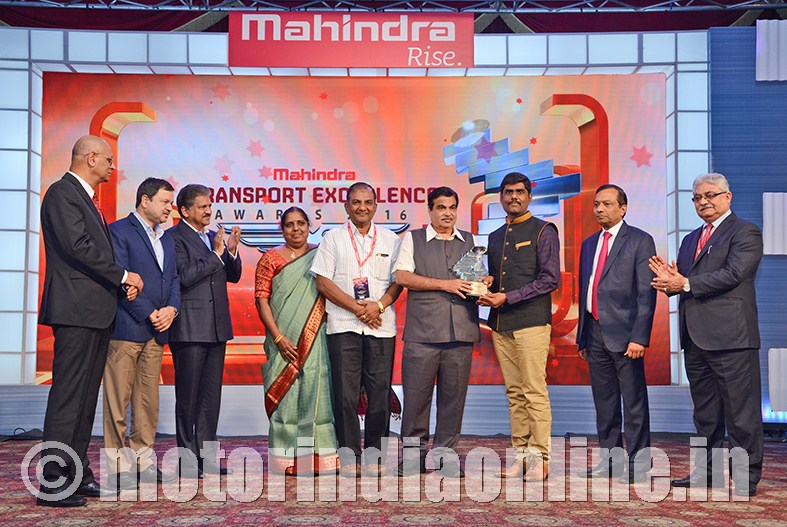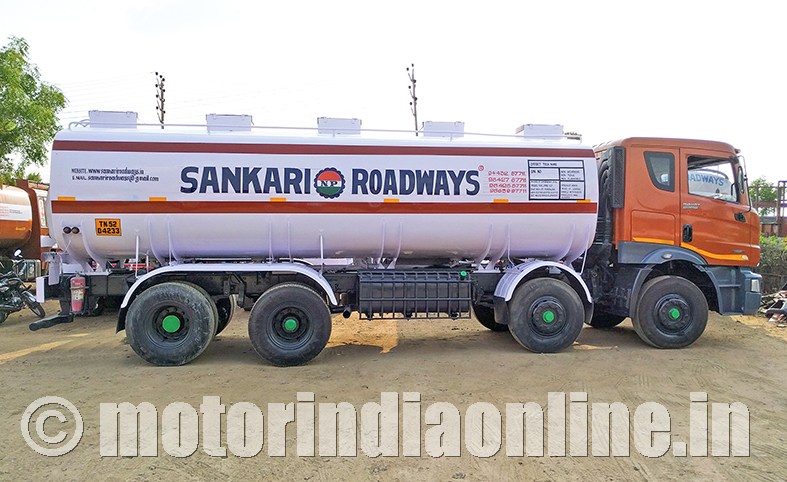By embracing driver sustainability and technology, the transporter has redefined tanker logistics for edible oil and chemicals in terms of innovation, efficiency and safety.

Sankari (Sankagiri) is a small panchayat town in Salem district of Tamil Nadu, developed around a hillock that houses a 15th century fort. No big deal, you may wonder. But sometime back Ashok Leyland launched its first truck variant powered by the ‘Neptune’ series engine ‘Sankagiri Express 3120’ in this tiny town named after it. That says a lot about the bond this town has nurtured with the truck maker all these years, an acknowledgement of passion and participation bobbing up from this region in developing new products.
Located right on the busiest NH 544 (previously NH 47) that deals hell lot of buses and bulkers all time between the industrial region of Coimbatore and Salem, Sankari is just 12 km away from Tiruchengodu, India’s borewell rig capital, and 50 km from the quintessential trucking hub Namakkal. The trucking community of this town is well known, almost 60 percent of the local population are presumably involved in lorry transportation either directly or indirectly. The Sankagiri Transport Association is considered one of the oldest and most influential in the State.
Traditionally known for its open truck hauling for cement and steel industries in the region, Sankari in the past decade has witnessed melioration in heavy-duty tankers and bulkers proprietorship. Epitomizing this development is Sankari Roadways, one of the premier transporters in the town, sharing not just its name but also its heritage for nearly 48 years. The company is now primarily into tanker logistics for edible oil and chemicals (both hazardous and non-hazardous), while also plying bulkers and open body trucks for cement and coal. Its esteemed clientele includes Marico Ltd., National Peroxide Ltd., BASF India Ltd., and Bunge India Ltd., among others across the country.
Dynamics in tanker logistics
The Business Head of the company today, Mr. R. Sangeeth takes pride in the way both Sankari and his company have evolved in the past four decades. “With a humble beginning as a betel leaf carrier using a single national permit truck from the Salem region to Mumbai in 1970, we have surpassed the land mark of 100 trucks operating with NP around the country”. It’s the passion to excel in transportation by maintaining the highest standards of service to our customers, backed by innovation and technology adoption, that drives his company, he claims.
Providing efficient, trouble-free and seamless tanker logistics solutions is a challenging business involving safety risks, says Mr. Sangeeth, adding that his company has well-laid-out emergency management protocols and technological know-how to ensure health and safety of his men, material and the environment. His entire fleet for edible oil transportation is FSSAI-certified, while chemical tankers are integrated into the Indian Chemical Council’s Nicer Globe platform along with GPS tracking data for 24/7 SOS assistance.
In Mahindra Transport Excellence Awards 2016 supported by the Ministry of Road and Highways, Sankari Roadways was adjudged as the national winner of the ‘Safety Award’ in both hazardous and non-hazardous goods transportation. It also secured ‘National Runner-up for the Torch Bearers Safety’ of the year 2017 the next year.
Apart from GPS tracking reports generated for its entire fleet online, Sankari Roadways has equipped its tankers with two cameras (atop the cabin covering top compartment openings and the lower side of the cabin covering the valve box) and one door sensor in the valve box. Using the GPS geofencing details, the system generates new trip when the tanker enters the loading area and completes the trip when the tanker exits the unloading area.

Camera recording is enabled automatically when the vehicle enters the loading area and camera recording is automatically disabled when the tanker is empty and exits the unloading area. Drivers and managers receive unique OTP in their networks in all these stages, ensuring top-notch accuracy and authenticity, thereby preventing material thefts and pilferages that are rampant in tanker logistics.
Driver training is another area that Sankari Roadways is known for. “Retaining drivers in spite of heavy pay scale is important, but even more its skilling them towards haulage safety and efficiency”, observes Mr. Sangeeth. His company is already collaborating with Ashok Leyland’s Namakkal driver training center to mandate yearly-once course for all its drivers on efficient driving, SOS emergency management, best practices in road and cargo safety, and so on.
Growth and market prospects
Mr. Sangeeth recounts that the growth of the ‘value segment’ haulage trucks is imminent. “Driver shortage is here to stay, limiting the outlook for tractor-trailers. Therefore, heavy-duty rigid axle tankers and bulkers in the 31-37 tonnage are going to be the mainstay in the region. They are efficient and best suited for our applications”, he adds. Almost half of Sankari Roadways fleet comprises of Ashok Leyland vehicles, while around 30 per cent are of Tata Motors. BharatBenz and Mahindra have 16 per cent and 6 per cent share respectively.
“Our growth and long-term goals are not focused in the number of vehicles we own, but in the efficient haulage and service delivery for our clients. With shift towards higher tonnage vehicles, the amount of goods we handle is multiplying. Yet, our growth is aimed at two important aspects. One, educating and standardizing the mindset of drivers with respect to evolving trucking and market principles, including sustainability. The second is to concentrate more on hazardous and chemical logistics, as customers in this segment demand able and competent transporters,” asserts the Business Head.
In FY 2017-18, Sankari Roadways claims to have made a notable progress, in spite of GST tethering issues in billing and accounting at their customers’ end, which resulted in delayed payments. Growth rate is at healthy 25 per cent, it adds. The company aims to add at least 15 HCVs every year, pushing up the fleet size to over 200 by 2025.
Yet Mr. Sangeeth cautions that the trucking industry in Sankari is facing dire crises. In the milieu of driver shortage and retention, the vehicle proprietorship has expanded phenomenally owing to credit availability in the past decade or so. This has resulted in the industry reaching a saturation point, but without adequate growth and capital formation. He cites several instances of financial seizure of vehicles and trucking entrepreneurs closing down in the region.
Asked about the challenges to his business, he said the freight rates are going down owing to the absence of regulatory adherence and the unorganized way of trucking that still exists in the industry. Higher fuel prices and toll rates per km hit profitability. In terms of just-in-time-delivery, he acknowledges the benefits of initiatives like FASTag and e-way bills, but observes that very little improvement is noticeable in reality. The road infrastructure is of course improving, yet the country still needs to go a long way, he adds.
